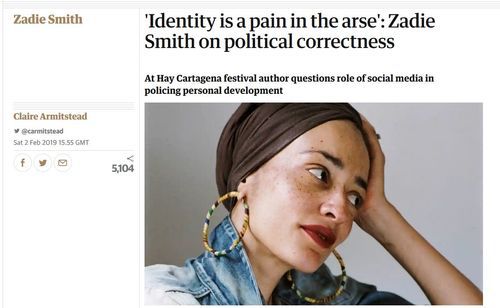


02/06/2019
The novelist Zadie Smith is an attractive lady of mixed-race background from London. She seems like a nice person with less hostility than is common these days and an urge to hold herself to old-fashioned standards. She seems cognizant that she has benefited from affirmative action urges for part-black people like herself and is one of the rare individuals to be grateful for these opportunities.

I’ve only skimmed White Teeth, her famous first novel published in the 2000. White Teeth is kind of a nature-nurture novel involving identical twins and DNA and parents of different cultures — the kind of materials that usually get channeled into sci-fi novels, but in this case was used in the more prestigious contemporary realist genre. The book got all sorts of literary accolades. My impression from a few hours with it is … it’s not quite that good. But on the other hand it’s awfully good for an ambitious novel by a person in her early 20s.
Commenter YetAnotherAnon points out that Smith said something similar herself recently:
The writer Zadie Smith laid into identity politics in a headline session at the 14th Hay Cartagena festival, insisting novelists had not only a right, but a duty to be free…
Returning to the issue of political correctness, she reflected on her debut novel White Teeth, which had depicted characters from many backgrounds but, she said, had been given an easy ride by the white critics because “[its characters] were mostly brown. It had all sorts of mistakes I’m sure but if I didn’t take a chance I’d only ever be able to write novels about mixed-race girls growing up in Willesden.”
Here are bits from a short story in The New Yorker, “Now More than Ever,” by Zadie Smith, author of White Teeth and a professor of creative writing at NYU.
… In my apartment building, as in many throughout the city, we have this new routine. We stand at our windows, all of us, from the second floor to the seventeenth, and hold aloft large signs with black arrows on them. The arrows point to other apartments. In our case, to the apartments of our colleagues at the university. The only abstainers are the few remaining Marxists (mainly in the history department, though we have a few in English and sociology, too) who like to argue that the whole process is fundamentally Stalinist. Which is like calling a child Mary. Who even uses that kind of language these days? Bendelstein, Eastman, and Waite are pointing at me. (A purely defensive move; I have done nothing wrong and am no one, and they are only trying to distract attention from themselves.) I am pointing at Eastman, in his dank little studio with the paisley carpet. Yes, since my illuminating discussion with Scout I have decided to join the majority of my colleagues in the philosophy department and point at Eastman, because who doesn’t know about Eastman? How Eastman still has a job we really don’t know. Not only does he not believe the past is the present, but he has gone further and argued that the present, in the future, will be just as crazy-looking to us, in the present, as the past is, presently, to us, right now! For Eastman, surely, it’s only a matter of time.
… I bumped into someone on Bleecker who was beyond the pale. I felt like talking to him so I did. As we talked I kept thinking, But you’re beyond the pale, yet instead of that stopping us from talking we started to talk more and more frantically, babbling like a couple of maniacs about a whole load of things: shame, ruin, public humiliation, the destruction of reputation — that immortal part of oneself — the contempt of one’s wife, one’s children, one’s colleagues, personal pathology, exposure, suicidal ideation, and all that jazz. I thought, Maybe if I am one day totally and finally placed beyond the pale, I, too, might feel curiously free. Of expectation. Of the opinions of others. Of a lot of things. “It’s like prison,” he said, not uncheerfully. “You don’t see anybody and you get a lot of writing done.”
… Then I made a mistake. This was yesterday. If you’re anything like Scout, you probably heard about it already. (Scout e-mailed me fifteen minutes after it happened to commiserate and also to alert me to the fact that she would not be e-mailing me anymore.) How it happened was: one of our poets said something beyond the pale. … All arrows pointed to him. And I said, Look, politically you’re absolutely within your rights to be angry, but existentially you’re wrong — existentially this particular poet just wants us all to be free. As a matter of fact, he’s not even a poet at all, he’s a philosopher. Yes, I said it: He’s one of us. But then the poet himself said that philosophy makes nothing happen and also that he happened to quite like the Devil — whom we sometimes call “the adversary” and sometimes nothing at all — and then he said that he was glad that he-who-shall-not-be-named had come to power, because he admired his energy, his inability to distinguish between past, present, and future, and soon after that the poet got cancelled and, soon after that, me, too.
I wonder who Eastman, the beyond the pale guy, and the poet are. My wild guess is the poet is film director David Lynch, although Lynch may have proven to have gotten away with expressing a certain amount of sympathy for Trump last summer, on the grounds that, well, he’s David Lynch.